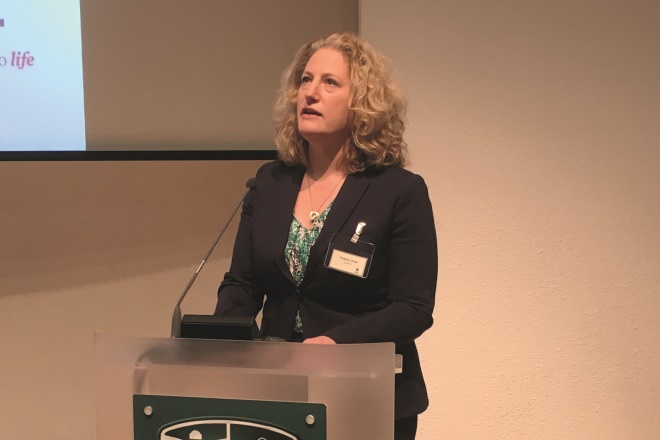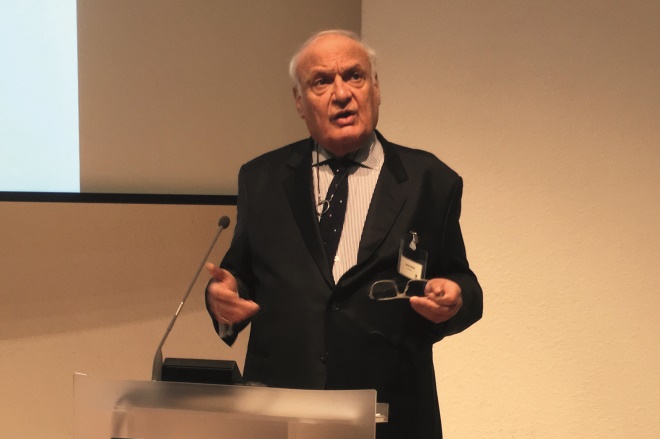
Shutterstock.com
On 20 November, the General Affairs Council of the European Union will officially announce the new location of the European Medicines Agency (EMA).
The move, necessitated by the UK’s controversial decision, in June 2016, to leave the EU, raises many issues, not least those around business continuity and public safety across Europe, but also the impact the move will have on medicines regulation and science and research in a post-Brexit United Kingdom.
With negotiations between the British government and the EU currently at deadlock, and the prospect of a ‘no-deal’ becoming a real possibility, fears for the future are intensifying.
The EMA, which was set up in 1995 and has been located in London since that time, monitors and approves medicines across a bloc of 28 EU member states and 500 million people. It has access to a network of 4,500 experts and is essential to the functioning of the single market for medicines in the EU.
A total of 19 cities across Europe have submitted comprehensive bids setting out why they should be chosen as the new location for the EMA.
The European Commission (EC) has published the bids alongside its own analysis of how each applicant meets the agreed criteria — from the technical suitability of the proposed building to the availability of multi-lingual education and accessibility (see infographic)[1]
.
Potential damage to medicines system
In a statement, issued at the end of last month, the EMA warned that, in a worst-case scenario, its relocation from London could permanently damage the medicines regulatory system.
One of the main concerns, highlighted in a staff survey, was a reluctance by a large number of the agency’s 900 staff to leave London, especially if an Eastern European city is chosen.
The survey found fewer than 30% of existing staff would be willing to relocate to eight of the 19 candidate cities — Bucharest, Malta, Sofia, Warsaw, Helsinki, Bratislava, Athens and Zagreb — including one unnamed city where the estimated staff loss could be 94%[2]
.
Should this scenario unfold, warns the EMA, the agency would be “unable to operate” — a situation, it says, that would require “emergency legislative measures at EU and national levels and would lead to a ‘public health crisis’”.
Only the top five cities — Amsterdam, Barcelona, Copenhagen, Milan and Vienna — would, according to the survey, see the EMA keep more than 60% of its staff.
Some staff losses can be absorbed but beyond a critical threshold the EMA will not be able to protect the health of European citizens
“Some staff losses can be absorbed with the EMA’s business continuity plan,” says an EMA spokesperson, “but beyond a critical threshold the agency will no longer be able to fulfil its mandate to protect the health of European citizens.”
Uncertainty about whether an EU agency based in Europe would be able to employ UK citizens after Brexit adds further complexity to the issue and if this is not permitted, UK employees of the EMA — 61 of them, although some may have dual nationality with other EU states — would be out of a job.
On 16 October, the EMA published its Business Continuity Plan (BCP) for Brexit which focuses on the need to keep its most important functions running smoothly during the transition to a new location. The document stresses that it is the EMA’s aim to operate for as long as possible under a “business as usual” scenario, during which time it will strive to comply with its 2017–2018 strategic objectives, initiatives and performance indicators[3]
.
EMA might be forced onto plan B
However, it warns that should it find itself in a position where it is unable to compensate for large staff losses, following its relocation, it would be forced to invoke its Brexit preparedness BCP.
The plan sets out how the agency would decrease its activities, according to three priority levels, to limit the the impact on public health and the ability of the agency to function properly. Activities such as corporate governance, audits and conferences are listed as Category 3, or the lowest, priorities; Category 2 priorities that include public health and strategic activities, such as contributions to the fight against antimicrobial resistance and collaborations with health technology assessment bodies; while Category 1 activities are either directly related to the assessment and safety monitoring of medicines or vital for maintaining the infrastructure of the European medicines regulatory network.
To continue to perform just its most highly prioritised activities, the EMA says it needs 462 full time equivalent (FTE) staff — close to 50% of its current staff. It needs another 140 FTE to carry out medium priority work and a further 110 to continue to perform its lowest priority activities.
“We want to make sure that, for patients, we don’t skip a beat,” says Virginia Acha, executive director of research, medication and innovation at the Association of the British Pharmaceutical Industry (ABPI). “If we lose some of the key individuals, it will really throw the pace a bit.”

Source: Julia Robinson / The Pharmaceutical Journal
Virginia Acha, executive director of research, medication and innovation at the Association of the British Pharmaceutical Industry, says that losing key individuals from the EMA will slow processes down
Former EMA director Thomas Lonngren suggests the final decision on the new location will be largely political: “It will probably not be where it is best located,” he says, adding that an Eastern European city could have a strong argument from a fairness point of view, referring to a 2008 agreement among EU leaders which gives priority to acceding states in the distribution of the seats of other agencies set up in the future.
Although this procedure concerns relocation rather than the setting up of new agencies, the European Commission points out that the spirit of that leaders’ agreement should be taken into account.
For the European Federation of Pharmaceutical Industries and Associations, the key issue is “seamless transition” and continuity of regulation in the run up to the move and beyond. But communications manager Faraz Kermani warns it is important the decision “benefits the EMA as well as the EMA benefiting the city.”
UK assessment decoupled from Europe
What is certain is, that wherever the final location of the EMA is, there will be implications for the UK. The UK will, of course, be losing a valued employer and many highly paid jobs — but it will also see its pharmaceutical and veterinary assessment procedures potentially decoupled from that of the rest of Europe.
Currently, the UK enjoys “reference member state” (where it evaluates the marketing authorisation application dossier and prepares the assessment report on behalf of the concerned member states in a mutual recognition procedure and decentralised procedure) and “rapporteur” (where it reports back to the EMA) status — Brexit puts both at risk.
“From a British point of view the thing is not so much the EMA physically leaving as the UK and European systems diverging,” says Mark Dayan, policy and public affairs analyst at the Nuffield Trust.
How wide that divergence will be is unlikely to be clear until later in the Brexit negotiations. Such detail will be tackled after the headline discussions on Britain’s exit from the EU.
Both the post-Brexit EMA and the UK will have to provide more regulatory capacity, Lonngren points out. “The regulatory system across Europe has developed over many years and it is working extremely well,” he says. “It’s an example of where the EU is at its best. Not even a hardline Brexiteer could question that!”

Courtesy of the European Medicines Agency
Thomas Lonngren, former director of the European Medicines Agency, says the regulatory system across Europe has developed over many years and “is an example of the EU is at its best”
The Medicines and Health products Regulatory Agency (MHRA), an executive agency of the Department of Health responsible for ensuring that medicines and medical devices work and are acceptably safe, currently leads between 20% and 30% of the EMA’s licensing and vigliance work as a rapporteur body.
MHRA will have to take on the full burden of UK medicines regulation and will lose a third of its income, which comes from the EU
The MHRA will feel the impact of the EMA relocating not only because it could have to take on the full burden of the UK’s medicines regulation and monitoring post-Brexit, but because it will lose up to a third of its income from the EU. The EMA itself is also likely to feel the impact of losing the MHRA. It is potentially a lose–lose situation.
But chief executive of the MHRA, Ian Hudson, in the foreword of the agency’s annual accounts documents says: “We are still considering two main models for the post-Brexit regulation of medicines — one in which we continue to operate in partnership of some form with the EMA regulatory network; another in which we would be a standalone regulatory Agency, outside European procedures. Negotiations have not yet begun, but we will be prepared for any outcome and will retain protection of public health and patient safety as our guiding principles, whatever the future model agreed[4]
.”

Courtesy of the Medicines and Healthcare products Regulatory Agency
Ian Hudson, chief executive of the Medicines Healthcare and Product Regulatory Agency, says the agency is preparing for two scenarios: one of continued partnership with the EMA; the other leaving the MHRA cut off from European procedures
The report identifies four main threats from Brexit: the ability of the MHRA to efficiently protect public health, loss of funding leading to inability to fulfil statutory duties, loss of potential outsourcing of work from the EMA leading to a reduction in income, and patients in the UK having to wait longer for access to new drugs.
An alternative solution could be that the UK adopt some of the EMA decisions — while having no involvement with those decisions or how the agency is run, suggests Dayan.
He suggests “some sort of fudge” solution might be found to some of these issues but the “red line” of European Court of Justice (ECJ) jurisdiction could be a sticking point preventing close post-Brexit working with the EMA . Would the UK be willing to accept positions where the ECJ could potentially be asked to adjudicate on licensing appeals, for example?
“It will be very regrettable for both the UK and the EU if there are to be completely separate systems,” he says. “I think there is a fair amount of goodwill on all sides. But it is hostage to wider aspects of the (Brexit) negotiations.”
Claire Thompson, deputy chief scientist at the Royal Pharmaceutical Society, says: “At the moment, we don’t know whether the UK will be able to remain as a reference member state in the approval of medicines. If it can’t, the knock-on effect could be longer timelines for approval and patient access to medicines.”
MHRA chairman, Sir Michael Rawlins says the organisation’s priority will continue to be to make sure the UK public has access to the right medicines at the right time.
“We believe this is best achieved by continuing to contribute to the EMA,” he says. “We are currently developing plans for how we will regulate after the UK leaves the EU, whether as part of the EMA or on our own. We know the final negotiations will affect how we operate in the future. But, that does not mean they will affect UK patients accessing important medicines.”
MHRA ‘in discussions’ with Australia and New Zealand
According to an unnamed source, the MHRA is in discussions with the regulatory systems in Australia and New Zealand, but any joint licensing approach would still cover a relatively small market. There are already mutual recognition agreements between the EU and and a number of other countries which the UK could try to build on[5]
.
The Department of Health believes Brexit could bring opportunities, albeit as yet unknown. There have been suggestions that NHS England’s Accelerated Access Review of Innovative Medicines and Medical Technologies, announced in November 2014, which aims to speed to innovative drugs, devices, diagnostics and digital products for NHS products, if combined with a strengthened MHRA could plug the gaping hole the EMA leaves.
After 2019 the UK will have no say in EU regulation, while at the moment we have a major say
Parliamentary Under Secretary of State at the Department of Health Lord O’Shaughnessy says there are three principles for regulation post-Brexit — patients should not be disadvantaged; innovators should be able to access the UK quickly; and the UK will continue to play a leading role in promoting public health[6]
.
Saad Shakir, director of the Drugs Safety Research Unit in Southampton, an independent academic unit internationally respected for its work in pharmacovigilance, says the EMA function has become important for public health — and that should not be lost. “When after 2019 the EU adds new regulatory guidance and requirements we will have no say in it,” he adds. “At the moment we not only have a say in it we have a major say.”

Source: Julia Robinson / The Pharmaceutical Journal
Saad Shakir, director of the Drugs Safety Research Unit in Southampton, says the EMA function has become important for public health — and that should not be lost
And if the UK stops adopting new guidance, he says, it risks diverging from the European system completely and adding complications for companies wanting to license products.
If the UK has to set up its own system of licensing medicines, rather than being part of a pan-European system serving more than 500 million people, it will inevitably face further challenges.
UK could be left behind as a smaller market
As a smaller market — and one where medicines not only have to go through a regulatory system but also often have the Health Technology Assessment hoop to jump through, via the National Institute for Health and Care Excellence (NICE), before they can be commonly prescribed — the UK could suffer.
Pharmaceutical companies might view it as lower priority than getting drugs into the bigger markets of the US, the EU and Japan. This might be a particular concern where the potential market for medicines is naturally small, such as those for rare diseases.
“If the systems don’t match each other, the likelihood is [companies] will launch first in Europe,” says Kermani.
A related concern is that the UK, unleashed from the EU, may not be as attractive a base for pharmaceutical companies. Acha points out that pharmaceutical companies have a long lead-in time before making major decisions and those on future locations post 2019 will start to be taken early next year. It might be the case, she says, that some companies feel they would need a batch release site in the EU post-Brexit, for example.
The uncertainty over the impact of Brexit has already led to UK universities and companies being omitted from consortia which are applying for European funding
Thompson says: “Research funding is a major concern. UK researchers are unclear on how withdrawal from the EU will impact existing partnerships and significant funding streams, such as Horizon 2020. The uncertainty over the impact of Brexit has already led to UK organisations (universities and companies) being omitted from consortia which are applying for European funding.”

Source: Royal Pharmaceutical Society
Claire Thompson, deputy chief scientist at the Royal Pharmaceutical Society, says that as yet, we don’t know whether the UK will be able to remain as a reference member state in the approval of medicines
Lonngren has already spoken to young biotech companies planning to move into the European market from the US — and who are now reconsidering the UK as a destination because of Brexit. As they would need to have an office in the EU anyhow, they might consider establishing themselves there rather than the UK, he warns
If the eventual solution keeps the UK and EU systems close together, some of these decisions may transpire to not have been necessary. “There is no single decision point,” says Ms Acha. “But it is difficult for companies to risk manage if they are dealing with a vague or moving picture.
“I think it is important to acknowledge that the decision of the UK vis-a-vis Europe will be one of the factors in their mind when making decisions — which it was not a year and a half ago.”
However, the evidence would suggest that there has been no rush by pharmaceutical companies to leave the UK and some have even announced greater investment. The UK has a wealth of researchers and a number of world-class universities, factors which are likely to keep firms here post-Brexit, says Kermani. It is possible, he suggests, that some firms will want to set up additional offices in the city chosen to host the EMA.
Decision could be made by drawing lots
With 18 months to go until Brexit, uncertainty is the biggest risk factor. The final decision on 20 November will be taken after what is likely to be multiple votes by the EU27 ministers — and could see some tactical voting by some states — a bit like Eurovision. If a majority of the countries choose one city as their preferred offer, there will be an outright winner immediately. However, it is more likely that three cities (more if there is a tie) will go through to a second round and there could be a third round with just two cities. Lots could be drawn in the event of a tie.
One complicating factor is that the winner of this contest cannot then go on to host the European Banking Authority. Several cities have applied for both, but competition for the EBA is less fierce. Could there be tactical withdrawals from the EMA race from countries wanting the EBA? Could deals be done giving one agency to an Eastern European country and the second to one of the older established EU members? One which has been mooted would give Frankfurt the EBA and Bratislava the EMA[7]
.
One thing is certain however: the UK will not only get ‘nul points,’ it will not even be in the room and, although the EMA’s fate may be known in the not-too-distant future, it most certainly will not be the end of the story.
References
[1] Council of the European Union. Offers to host the European Medicines Agency (EMA). Available at: http://www.consilium.europa.eu/en/policies/relocation-uk-based-agencies/ema/ (accessed October 2017)
[2] European Medicines Agengcy. EMA business continuity planning and impact of staff retention scenarios from the EMA staff survey. 26 September 2017. Available at: http://www.ema.europa.eu/docs/en_GB/document_library/Other/2017/09/WC500235516.pdf (accessed October 2017)
[3] European Medicines Agency. European Medicines Agency Brexit Preparedness Business Continuity Plan. 13 October 2017. Available at: http://www.ema.europa.eu/docs/en_GB/document_library/Other/2017/10/WC500236755.pdf (accessed October 2017)
[4] Medicines and Healthcare products Regulator Agency. Annual Report and Accounts 2016/17. Available at: https://www.gov.uk/government/uploads/system/uploads/attachment_data/file/630517/MHRA_Annual_Report_and_Accounts_16-17.pdf (accessed October 2017)
[5] European Medicines Agency. Mutual recognition agreements. Available at: http://www.ema.europa.eu/ema/index.jsp?curl=pages/regulation/general/general_content_001843.jsp&mid=WC0b01ac058005f8ac (accessed October 2017)
[6] GOV.UK. Speech given by Lord O’Shaughnessy on Brexit and medicines regulation. 11 August 2017. Available at: https://www.gov.uk/government/speeches/speech-given-by-lord-oshaughnessy-on-brexit-and-medicines-regulation (accessed October 2017)
[7] Council of the European Union. Decision on the procedure for relocation of EU agencies currently located in the UK. 22 June 2017. Available at: http://www.consilium.europa.eu/press-releases-pdf/2017/6/47244661589_en.pdf (accessed October 2017)

